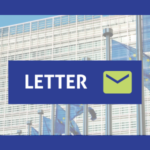Subject: 80+ organizations ask EU-Parliament to stop support for fossil fuels
Dear Member of the European Parliament,
We are writing to you concerning an infrastructure priority list (list of Projects of Common Interest). An objection to the current form of the list will be voted in the next Plenary Session of the European Parliament in March and you will have the opportunity to support this objection.
We want to raise your awareness for this priority list since it will grant highest national importance to over 100 fossil fuel projects.
While the list contains also electricity projects, there is a very high amount of fossil gas projects on it. If these costly projects are realized, they risk undermining the achievement of the Global Paris Climate Agreement that the EU ratified in 2016. Fossil gas, or “natural” gas emits significant amounts of CO2 when it is burned and leaks methane, a powerful greenhouse gas over 87 times more potent than CO2.[1]
Thus, gas is not a climate solution and a prioritization of this fossil fuel threatens to aggravate climate change.[2]
The priority list aims at adding 100+ gas infrastructure projects to the European gas network and at making these projects eligible for funding with EU tax-payers money.[3]
However, there is in most cases no need for more pipelines, compressor stations and gas terminals: There are soaring overcapacities in most Member States and many idle installations. Gas infrastructure is designed to operate for 40, 50 or more years and a gas priority list strongly risks creating important stranded assets. The costs for this expensive, unneeded infrastructures risk being carried by European citizens.
The European Parliament is not involved in the development of this list, and there is a clear lack of transparency concerning the selection of projects. This is highly problematic, particularly since the defining actor in designing this priority list is the gas industry itself.[4] This serious conflict of interest leads to a list of projects which is clearly out of touch with existing needs and the climate reality.
The objection to the list gives a mandate to the EC to change its list of gas projects, but not the other projects. It aims at protecting projects that truly support a transition towards 100% renewables and energy efficiency.
We therefore urge you to object to the list in its current form and ask the Commission to draft a new list in line with European climate and energy targets.
Sincerely,
Friends of the Earth Europe
Food & Water Europe
On behalf of:
Pan-European organizations:
350.org, Europe
Clean Adriatic Sea Alliance
Climate Action Network (CAN) Europe
Corporate Europe Observatory
Counter Balance
EKOenergy
Green Budget Europe
Greenpeace EU
HEAL – Health and Environment Alliance
Justice and Environment
The Gastivists Collective
Transport & Environment
International organizations
Oil Change International
Transnational Institute (TNI)
European organizations:
Austria
Attac Austria
Finance & Trade Watch
GLOBAL 2000
“System Change, not Climate Change!”
Croatia
Greenpeace Croatia
Jadranski zid, Split
Nonprofit civic initiative NAŠ Jadran
Zaustavimo TTIP
Zelena akcija/Friends of the Earth Croatia
Finland
Friends of the Earth Finland – Maan ystävät
France
Attac France
Collectif contre le gazoduc transfrontalier STEP MidCat
L’association PIERREDOMACHAL
Les Amis de la Terre
Germany
Abgefrackt Bündnis Weidener Becken gegen Fracking
Aktionsbündnis No Moor Fracking
Arbeitskreis Fracking Braunschweiger Land
Berliner Wassertisch
BI Gemeinsam gegen Gas- und Probebohrungen am Niederrhein
Bund für Umwelt und Naturschutz (BUND)
Bürgerinitiative FrackingFreies Hamburg
Bürgerinitiative gegen CO2-Endlager e.V.
BürgerInneninitiative Umweltschutz Uelzen
Deutsche Umwelthilfe (DUH), Germany Energy Watch Group
FAIRändern e.V.
Frackloses Gasbohren im Landkreis Rotenburg
Leave it in the Ground Initiative (LINGO)
Hungary
Clean Air Action Group
Ireland
FÍS NUA
Fracking Free Ireland
Friends of the Earth Ireland
Keep Ireland Fracking Free
Not Here, Not Anywhere
People’s Climate Clare
Safety Before LNG
Italy
Legambiente Onlus
Luxemburg
Friends of the Earth Luxembourg, Mouvement Ecologique
Netherlands
Friends of the Earth Netherlands, Milieudefensie
Poland
Polski Klub Ekologiczny/Friends of the Earth Poland
Portugal
ZERO – Associação Sistema Terrestre Sustentável
Slovenia
Focus Association for Sustainable Development
Spain
350BCN
Amigos de la Tierra
Asociación de Cultura Popular Alborada
Associació de Naturalistes de Girona
Berriztu, Basque Country
Comité Cidadán de Emerxencia da Ría de Ferrol, Galicia
Ecologistas en Acción
Fracking Ez, Basque Country
Instituto Internacional de Derecho y Medio Ambiente (IIDMA)
No Mes Gas Barcelona
Observatorio Crítico de la Energía
Observatori del Deute en la Globalització
Plataforma Cantabria por lo Público y Sin Recortes
Plataforma Ciudadana Zaragoza sin Fractura
Plataforma por un Nuevo Modelo Energético
Plataforma Resposta al Midcat
Xarxa per la Sobirania Energètica
Sweden
Fossilgasfällan
PUSH Sweden
Switzerland
fossil-free.ch
UK
Friends of the Earth England, Wales and Northern Ireland
Platform
Reclaim the Power
UK Youth Climate Coalition
non-European organizations
North Country 350 Alliance, New York, USA
The Upper Valley Affinity Group, Vermont, USA
[1] https://www.ipcc.ch/pdf/assessment-report/ar5/wg1/WG1AR5_Chapter08_FINAL.pdf
[2] https://www.research.manchester.ac.uk/portal/en/publications/natural-gas-and-climate-change(c82adf1f-17fd-4842-abebf16c4ab83605).
html
[3] http://eur-lex.europa.eu/legal-content/en/TXT/?uri=CELEX:32013R1316
[4] For more information on this issue: http://www.foeeurope.org/sites/default/files/extractive_industries/2017/entsog_
fossil_free_europe_report_vfinal.pdf


